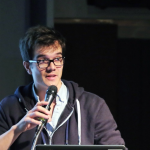The ASSC William James Prize
Previous Winners

Abhilash Dwarakanath
22nd Edition - Winner 2025
The twenty-second William James Prize for Contributions to the Study of Consciousness was awarded to Abhilash Dwarakanath in 2025. Abhilash's article "Bistability of prefrontal states gates access to consciousness" was published in Neuron in 2023 (https://doi.org/10.1016/j.neuron.2023.02.027). The paper proposes a novel and impactful framework for understanding the dynamics of consciousness.
Shervin Safavi
21st Edition - Winner 2024
The twenty-first William James Prize for Contributions to the Study of Consciousness was awarded to Shervin Safavi in 2024. Shervin's article "Multistability, perceptual value, and internal foraging" was published in Neuron in 2022 (https://doi.org/10.1016/j.neuron.2022.07.024). The paper proposes a novel computational approach to understand perceptual multistability.
Elisabeth Parés Pujolràs
20th Edition - Winner 2023
The twentieth William James Prize for Contributions to the Study of Consciousness was awarded to Elisabeth Parés Pujolràs in 2023. Elisabeth's article "Latent awareness: Early conscious access to motor preparation processes is linked to the readiness potential" was published in Neuroimage, in 2019 (https://doi.org/10.1016/j.neuroimage.2019.116140). The paper proposes a novel method to investigate neural correlates of conscious intention.
Ishan Singhal
19th Edition - Winner 2022
The nineteenth William James Prize for Contributions to the Study of Consciousness was awarded to Ishan Singhal in 2022. Ishan's article "Time and time again: a multi-scale hierarchical framework for time-consciousness and timing of cognition" was published in Neuroscience of Consciousness in 2021 (https://doi.org/10.1093/nc/niab020). The paper proposes a new hierarchical model of time-consciousness that provides a theoretical framework for the phenomenology of temporal experience.
Anat Arzi
18th Edition - Winner 2021
The eighteenth William James Prize for Contributions to the Study of Consciousness was awarded to Anat Arzi in 2021. Anat's article "Olfactory sniffing signals consciousness in unresponsive patients with brain injuries" published in Nature in 2020 (https://doi.org/10.1038/s41586-020-2245-5) was selected as the winning nomination. The paper shows that sniff responses can be used to diagnose the state of consciousness of patients with brain injuries and also robustly predict their future recovery.
Jake Quilty-Dunn
17th Edition - Winner 2020
The seventeenth William James Prize for Contributions to the Study of Consciousness was awarded to Jake Quilty-Dunn in 2020. Jake's article "Is Iconic Memory Iconic?" published in Philosophy and Phenomenological Research in 2019 (https://doi.org/10.1111/phpr.12625) was selected as the winning nomination. The paper investigates the distinction between iconic memory and visual working memory. It argues that differences in representational formats for these two forms of memory has consequences for theories of consciousness and the distinction between perception and cognition.
Vincent Taschereau-Dumouchel
16th Edition - Winner 2019
The sixteenth William James Prize for Contributions to the Study of Consciousness was awarded to Vincent Taschereau-Dumouchel in 2019. Vincent's article "Towards an unconscious neural reinforcement intervention for common fears" published in PNAS in 2018 (https://www.pnas.org/content/115/13/3470) was selected as the winning nomination. The study investigates reprogramming of naturally occurring fear responses outside of conscious awareness using fMRI decoding, allowing to bypass the subjective unpleasantness in conscious exposure to fear stimuli.
Jennifer Windt
15th Edition - Winner 2018
The fithteenth William James Prize for Contributions to the Study of Consciousness was awarded to Jennifer Windt in 2018. Jennifer's book "Dreaming: A conceptual framework for philosophy of mind and empirical research" (MIT Press, 2015) was selected as the winning nomination. The book outlines a comprehensive proposal for a conceptual framework for describing conscious experience in dreams, integrating philosophy of mind, sleep and dream research, and interdisciplinary consciousness studies.
Jean-Rémi King
14th Edition - Winner 2017
The fourteenth William James Prize for Contributions to the Study of Consciousness was awarded to Jean-Rémi King in Beijing, China, on the occasion of the 21st Annual Meeting of the Association of the Scientific Study of Consciousness. Jean-Rémi's paper "Brain mechanisms underlying the brief maintenance of seen and unseen sensory information" (Neuron 92.5 (2016): 1122-1134) was selected as the winning nomination. The study identifies the neural architecture supporting the encoding and the maintenance of subliminal images in the human brain, by using decoding and temporal generalization analyses of magneto-encephalography recordings. This study suggests that the content of conscious perception corresponds to the representational contents encoded in the deepest processing stages of perceptual processing.
Satohiro Tajima
13th Edition - Winner 2016
The thirteenth William James Prize for Contributions to the Study of Consciousness was awarded to Satohiro Tajima in Buenos Aires, Argentina, on the occasion of the 20th Annual Meeting of the Association of the Scientific Study of Consciousness. Satohiro’s paper “Untangling brain-wide dynamics in consciousness by cross-embedding” (PLOS Computational Biology, 11(11), e1004537, 2015) was selected as the winning nomination. The paper developed a powerful equation-free analysis (“cross-embedding”) to link the causal interactions and topological complexities in brain-wide activities, based on generic mathematical theorems in dynamical systems. This finding on dynamical integration of brain-wide information bridges and updates the previous neural theories of consciousness from a viewpoint of dynamics and topology.

Stephen Fleming
9th Edition - Winner 2012
The was awarded to Stephen Fleming in Brighton, UK, on the occasion of the 16th Annual Meeting of the ASSC. Stephen’s paper “Relating Introspective Accuracy to Individual Differences in Brain Structure” was selected as the winning nomination. The paper is one of the first investigations into the neural basis of introspective accuracy – the ability to reflect on one’s own performance. A key advance was the use of a psychometric method that equalized perceptual task performance across individuals, enabling isolation of variability in subjective confidence.
Aaron Schurger
10th Edition - Winner 2013
The was awarded to Aaron Schurger in San Diego, California, on the occasion of the 17th Annual Meeting of the ASSC. Aaron’s paper "An accumulator model for spontaneous neural activity prior to self-initiated movement" was selected as the winning nomination. The paper offers a novel account of the cortical "readiness potential" in terms of ongoing spontaneous fluctuations in neural activity, a neural accumulator, and a threshold. Schurger's account departs dramatically from the prevailing assumptions about the nature of the readiness potential and its relation to the conscious experience of "intending" to move.
Zhicheng Lin
11th Edition - Winner 2014
The prize was awarded to Zhicheng Lin in Brisbane, Australia, on the occasion of the 18th Annual Meeting of the ASSC. Zhicheng's paper "Priming of awareness or how not to measure visual awareness" was selected as the winning nomination. The paper describes a phenomenon called priming of awareness: visual awareness for low-visibility trials is elevated when these trials are mixed with high-visibility trials relative to when presented alone.
Alexandra Vlassova
12th Edition - Winner 2015
The prize was awarded to Alexandra Vlassova in Paris, France, on the occasion of the 19th Annual Meeting of the ASSC. Alexandra's paper "Unconscious information changes decision accuracy but not confidence". The paper uses a novel behavioural task and computational modeling to investigate the controversial idea that unconscious information can influence our decisions. The paper demonstrates that unconscious information can be accumulated in a similar manner but less effectively than conscious information, and that this information is used to boost or diminish decision accuracy.